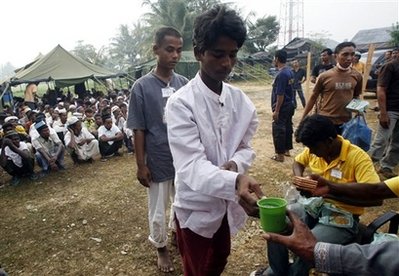Unwanted: Dead or Alive
In a small courthouse in Ranong, southern Thailand, in late January, Mamoud Hussein begged for mercy.
“Please don’t send me back! The Burmese army will kill me and my family,” he pleaded.
 |
| Rohingya boat people receive medical treatment at a temporary shelter in Idi Rayeuk of Indonesia's Aceh. (Photo: Reuters) |
Their crime: illegally entering Thailand to look for work.
An estimated 4,880 Rohingyas were arrested in 2008 for illegally entering Thailand, 90 percent of who are still waiting to be repatriated, according to the Bangkok Post, Thailand’s English-language daily.
Rohingya migrants are becoming a common pest for the Thai, Malaysian and Indonesian authorities. Repressed and discriminated against in Burma, hundreds have taken to the seas to try to smuggle themselves into neighboring countries to look for work. It is a perilous journey and many have died trying.
When they are caught, the Rohingyas are reportedly often beaten, abused and threatened by authorities before being towed back out to sea and set adrift.
 |
| Rohingya refugees queue up for food at a temporary shelter in Idie Rayeuk, Aceh province, Indonesia. (Photo: AP) |
The Burmese military government recently said that the Rohingya “boatpeople” are not among the national races of the country. Similarly, Bangladeshi authorities have said the Rohingya are not their citizens either.
And Thai premier Abhisit Vejjajiva was quoted by reporters in Bangkok as saying, “They [the Rohingyas] are not refugees. Our policy is to push them out of the country because they are illegal migrants.”
The plight of the Rohingya has recently gained publicity and the issue of their status—or lack of status—has finally drawn international condemnation.
International rights groups and agencies, including the United Nations High Commissioner for Refugees (UNHCR), Amnesty International and other rights groups, have called for Asian countries to show mercy in dealings with the Rohingya migrants.
The controversial issue of Rohingya migrants has been ongoing for centuries and is now spreading to Thailand, Malaysia, Indonesia and India.
The origin of the Rohingya is the subject of much dispute. Many Rohingyas claim that they are the true natives of Arakan State.
According to some historians, the region was visited by Arab traders from the seventh century onward and—having converted to Islam—cultural traits tend to support the theory that Rohingyas are part of the native population of the region.
However, local Buddhist Rakhine people (and the Burmese military government) claim that Rohingyas are migrants from southeastern regions in neighboring Bangladesh, in a process that started before the British colonial era, but has accelerated in recent years.
In 1948, shortly after Burmese independence, the Muslim immigrants called for the new central government to designate Arakan State’s Buthidaung and Maungtaw as their province. That same year, they launched an armed rebellion against the Burmese army through the Mujahid movement.
The Rohingya people were first recognized in Burma by the government of U Nu. Some even served in his administration.
1 | 2 next page »
|
||
|
||
|
||
|
||
|
||
|
||
- 'My Wife Died From Police Abuse,' Says Husband
- US Says Observer Conditions Don't Meet Int'l Standards
- 159 Observers to Monitor Burma Election
- Govt to Address Breaches of SSA-South Ceasefire: Aung Min
- Burma Investors Pin Hopes on Seminal Sunday
- Malaysia PM Leads 50-Strong Delegation to Burma
- US Congress to Assess Burma's Political Prisoner Issue
- Rangoon Woman in Police Station Death Plunge
- Burmese Legal System Remains Tool of Govt: AHRC
- Burmese Army Chief Defends Political Role
